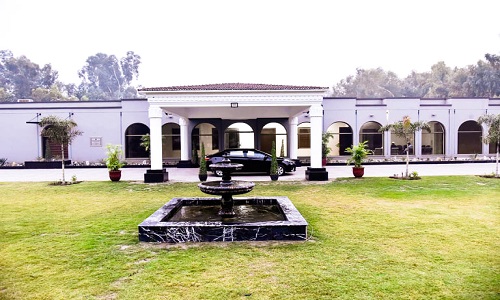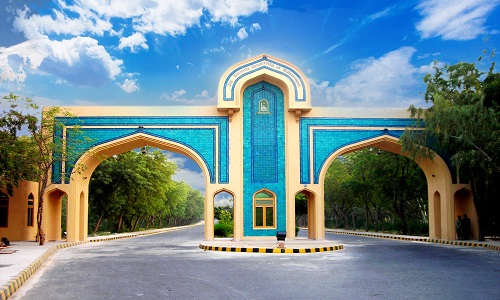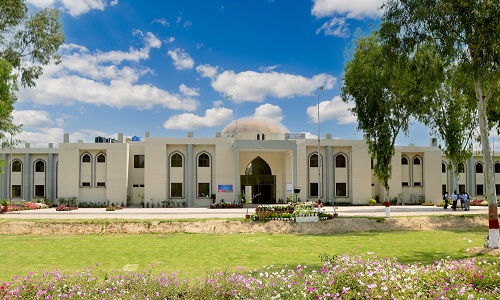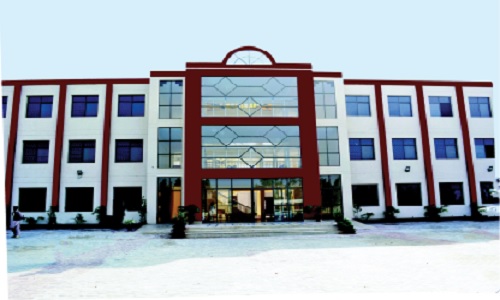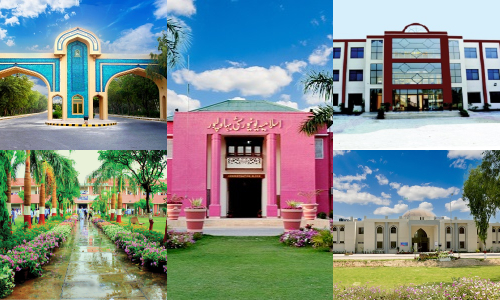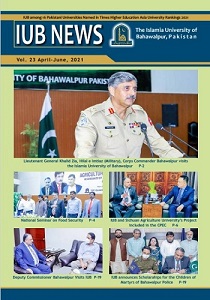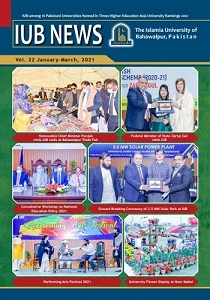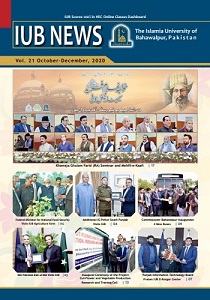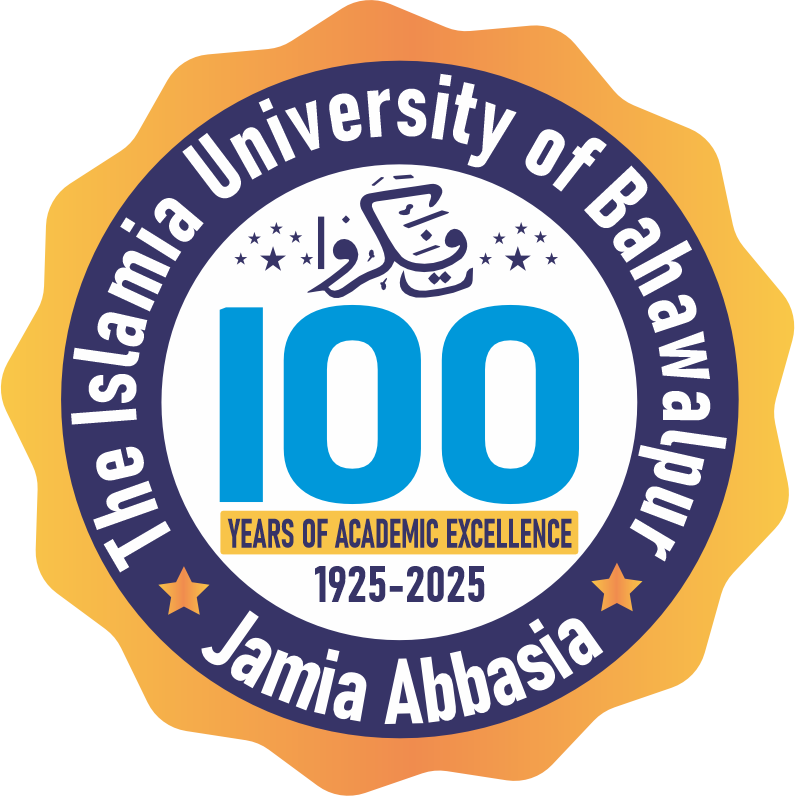Department of World Religions and Interfaith Harmony
The Department of World Religions and Interfaith Harmony was founded as a part of the Faculty of Islamic Learning in 2020. It aims to promote interreligious peace and harmony through the analytical yet empathetic study of religions. It prepares students for the Quranic call of interfaith dialogue and peace building.
Courses offered in the department enable students to have insight into contemporary religious issues with objectivity and open-mindedness. Increasing cultural awareness, this sort of study helps to examine the beliefs, institutions, and customs of major religions of the world to impart deep intercultural literacy. As an interdisciplinary field, it can play an influential role in almost every region of the world. Beyond developing the basic but essential skills in the students, their training in religious studies prepares them to work excellently in culturally diverse social settings. Hence, their employment chances increase tremendously not only in academia but also in the public and private institutions, organizations, and research centers. MS & PhD Programmes of Islamic Studies with Specialization in World Religions and Interfaith Harmony will also be launched.
Introduction
The Department of World Religions and Interfaith Harmony was founded in the year 2020. It aims to promote interreligious peace and harmony through the analytical yet empathetic study of religions. It prepares students for the Quranic call of interfaith dialogue and peacebuilding proclaimed in the following verses:
"Say O People of the Book! Let us come to common terms: that we will worship none but Allah, associate none with Him, nor take one another as lords instead of Allah" (Al-Quran 3:64)
"Your religion is for you: my religion is for me" (The Quran: 109:6)
Courses offered in the department enable students to have insight into contemporary religious issues with objectivity and open-mindedness. Increasing cultural awareness, this sort of study helps to examine the beliefs, institutions, and customs of major religions of the world so as to impart deep intercultural literacy. As an interdisciplinary field, it can play an influential role in almost every region of the world. Beyond developing the basic but essential skills in the students, their training in religious studies prepares them to work excellently in culturally diverse social settings. Hence, their employment chances increase tremendously not only in academia but also in the public and private institutions, organizations, and research centers.
Mission Statement
The Department of World Religions and Interfaith Harmony seeks interreligious peace and harmony by promoting the study of world religions in their classical and contemporary forms. It cultivates students’ analytical, critical, and empathic abilities to understand and solve contemporary religious issues and critically and respectfully engage with the world’s religious traditions.
Vision Statement
Using the tools of interfaith and cross-cultural dialogue and empathetic study of world religions, the department promotes interreligious peace and harmony in order to achieve a just, peaceful, and sustainable world.
Faculty
Major Benefits of the Study
- Understanding of the relationship of Islam with other world religions.
- Greater firmness in our faith.
- Opportunity for instilling peace in the local and global arena.
- Deep understanding of diverse cultures, nations, and communities.
- More employment opportunities.
- Scholarship opportunities across the world.
Objectives
- To re-vitalize religious heritage by promoting religious and cultural awareness.
- To formulate a network of scholars who can coordinate and unite the efforts of interfaith groups which encourage interreligious peace and harmony.
- To develop an environment of peace and harmony where different religious communities live together contributing to the overall progress of the world.
- To replace the religious and cultural fears and hatreds with compassion, sympathy, and respect.
- Serve as a nursery for future scholars.
Medium of Instruction
There are three media of instruction: Urdu, English, and Arabic. Students are given the choice to write their final projects in any of these languages.
Facilities Available to Students
Library, computer labs, highly qualified teachers, hostels, and well-furnished infrastructure.
8. List of Programs
The department is currently offering the following program:
- BS Islamic Studies with Specialization in World Religion and Interfaith Harmony (Morning).
8.1 BS Islamic Studies with Specialization in World Religion and Interfaith Harmony
This program is developed for the future requirements of global religious society. It aims at preparing graduates who are equipped with leadership qualities and professional expertise besides excellence in the religious field.
8.2. Special Features and Objectives
The program aims at producing vocationally strong graduates through discovering new fields of operation as well as developing new strategies of work. Equipped with the abilities to use modern techniques and skills, they become eligible for tremendous job opportunities in both public & private sectors particularly in the following areas:
- Human Resource Development through teaching and character building.
- An excellent career in research and development.
- A broad spectrum of socio-religious community services especially those of civil society organizations (NGO’s).
- Consultancy and advisory services rendered to the public and private organizations.
8.3. Admission and Eligibility
The following are the eligibility criteria for admission.
8.3.1. Qualification Required
Intermediate, equivalent, or Sanviyah Khassah
8.3.2. Duration & Semesters
8 Semesters, 4 years.
8.3.3. Documents Required
- Matriculation Certificate / Equivalent
- Intermediate Certificate / Equivalent
- Provisional / Character Certificate from the Head of the Institution last attended.
- Domicile Certificate.
- CNIC/Form B. of the candidate
8.4. Examinations and Grading
The examination will be taken twice a semester.
8.5. Attendance
75 % attendance is compulsory for taking the examination.
8.6. Course Curriculum
The program follows the course outline of BS Islamic Studies offered by the Faculty of Islamic Learning. However, the last two semesters of the program offer specialized courses. Following is the course outline of the specialized courses in the 7th and 8th semesters:
Course Code | Course Title | Credit Hour |
Semester-1 | Year-1 | |
WRIH-01101 | Intermediate English-I (C-1) | Non Cr. |
WRIH-01102 | English-I (Structure) (C-2) | 3 |
WRIH-01103 | General Mathematics (C-3) | 3 |
WRIH-01104 | Islamic Studies Compulsory (C-4)اسلامیات لازمی | 2 |
WRIH-01105 | Arabic (F -1) عربی | 3 |
WRIH-01106 | IT Skills (C-5) | 3 |
WRIH-01107 | Islamic History (G-1) تاریخ اسلام | 3 |
Total Credit | 17 |
Semester-2 | Year-1 | |
WRIH-01201 | Intermediate English-II (C-6) | Non Cr. |
WRIH-01202 | English –II (Literature) (C-7) | 3 |
WRIH-01203 | Pakistan Studies (C-8) | 2 |
WRIH-01204 | Everyday Science (G-2) | 3 |
WRIH-01205 | Basic Health Awareness (G-3) | 3 |
WRIH-01206 | Constitutional and Legal System of Pakistan (G-4) | 3 |
WRIH-01207 | Social Science (G-5) | 3 |
Total Credit | 17 |
Semester-3 | Year-II | |
WRIH-01301 | English –III (Communication Skills) (C-9) | 3 |
WRIH-01302 | Economics (G-6) | 3 |
WRIH-01303 | Psychology (G-7) | 3 |
WRIH-01304 | Social Work (G-8) | 3 |
WRIH-01305 | International Relations (G-9) | 3 |
WRIH-01306 | Islamic Mode of Communication (F-2) اسلامی ذرائع ابلاغ | 3 |
Total Credit | 18 |
Semester-4 | Year-II | |
WRIH-01401 | Critical Thinking and Reasoning(G-10)نقد واستدلال | 3 |
WRIH-01402 | Arabic Functional(F-3)روز مرہ عربی زبان | 3 |
WRIH-01403 | Introduction to Quranic Studies (M-1) تعارف مطالعہ قرآن | 3 |
WRIH-01404 | History of Hadith (F-4) تاریخ حدیث | 3 |
WRIH-01405 | History of Islamic Jurisprudence(F-5) تاریخ فقہ اسلامی | 3 |
Total Credit | 15 |
Semester-5 | Year-III | |
WRIH-01501 | Textual Study of Quran (Ilm-ul-Aqaid) (M-2)مطالعہ متن قرآن (علم العقائد) | 3 |
WRIH-01502 | Biography of The Holy Prophet (F-6)سیرت النبیﷺ | 3 |
WRIH-01503 | Foundations of Islamic Jurisprudence (F-7)مبادیاتِ اصول فقہ | 3 |
WRIH-01504 | Principles of Hadith (F-8)اصولِ حدیث | 3 |
WRIH-01505 | Study of World Religions (F-9)مطالعہ مذاہبِ عالم | 3 |
WRIH-01506 | Qur’anic Grammar & Tajweed (M-3)قرآنی گرائمر اور تجوید | 3 |
Total Credit | 18 |
Semester-6 | Year-III | |
WRIH-01601 | Legal Study of Qur’an (M-4) مطالعہ احکام القرآن | 3 |
WRIH-01602 | Textual Study of Hadith (F-10)متنِ حدیث | 3 |
WRIH-01603 | Al-Dawah wa Al-Irshad (F-11)الدعوۃ والارشاد | 3 |
WRIH-01604 | Political and Economic thoughts of Islam(F-12)اسلام کے سیاسی و معاشی افکار | 3 |
WRIH-01605 | Muslim History of Subcontinent (F-13برصغیر کی مسلم تاریخ) | 3 |
WRIH-01606 | Arabic Literature (F-14)ادبِ عربی | 3 |
Total Credit | 18 |
Semester-7 | Year-IV | |
WRIH-01701 | Muslims' Contribution to the Study of Religions (مطالعہ مذاہب میں مسلمانوں کی خدمات) | 3 |
WRIH-01702 | Study of Judaism (مطالعہ یہودیت) | 3 |
WRIH-01703 | Study of Hinduism (مطالعہ ہندومت) | 3 |
WRIH-01704 | Study of Sikhism (مطالعہ سکھ مت) | 3 |
WRIH-01705 | Research Methodology(G-11)اسالیبِ تحقیق | 3 |
Total Credit | 15 |
Semester-8 | Year-IV | |
WRIH-01801 | Interfaith Dialogue and Harmony (بین المذاہب مکالمہ وہم آہنگی) | 3 |
WRIH-01802 | Study of Christianity (مطالعہ عیسائیت) | 3 |
WRIH-01803 | Study of Buddhism and Jainism (مطالعہ بدھ مت و جین مت) | 3 |
WRIH-01804 | Study of Far Eastern Religions (مطالعہ مذاہب مشرق بعید) | 3 |
WRIH-01805 | Thesis / Research Project مقالہ)) | 6 |
Total Credit | 18 |
Total Courses: | 46 | Total Credit Hours: | 136 |
| | | | | |


